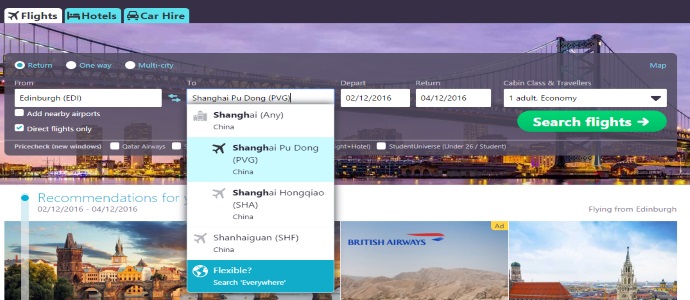
Pivotal moment in 2016 – when Ctrip bought Skyscanner for $1.8 billion
By cameron in Uncategorized
There are a number of elements to the Ctrip buys Skyscanner story that makes it worthy of being one of the most important of the year.
Perhaps the first is that most of those who have watched the growth of metasearch (sometimes feels as if that description is nearing the end of its shelf-life) companies in recent years, especially Skyscanner and Kayak, expected SOMETHING to happen sooner rather than later.
Skyscanner itself had spoken over the years about some kind of “liquidity event” – that wordy phrase that those in the financial community often use to describe, less obviously, a public listing or sale.
The company had already secured a $192 million funding round from global fund manager Artemis, investment provider Baillie Gifford, Malaysian government funding house Khazanah National Berhad, online specialist Vitruvian Partners and Yahoo Japan, earlier this year.
But that development did not necessarily mean that any strategic activity going on in the background was then put on hold – far from it, as it turned out.
Co-founder and CEO Gareth Williams was kind enough to write a backgrounder on the mechanics behind the deal, from his personal perspective, which we published here.
Those details are a fascinating look at what goes on when a company needs to pretend that everything is business-as-usual but, secretly, is pulling off the biggest development in its history.
What Williams doesn’t go into (he’s a bit too humble for that) is the wider enormity of the deal.
The $1.75 billion sale was the fourth largest tech company exit in UK history, behind those for ARM (Softbank for £24 billion), Autonomy (HP for £7.4 billion) and Telecity (Equinix for £2.35 billion).
It also marked the end of a chapter for the three tech-heads (Williams, Bonamy Grimes and Barry Smith) who created the company in 2001 after playing around with Excel spreadsheets to make finding ski trip flights more efficient.
Sure, Williams (and his two co-founders, both of which have left day-to-day operations at the company in recent years) has changed over the years, but lined up against some of the other major travel brand CEOs there is a down-to-earth demeanour about him that is not often found elsewhere.

Fluffy analysis aside, what the acquisition also really meant was a demonstration of the power and ambition of a company such as Ctrip (itself only two years older than Skyscanner).
Ctrip has not outgrown its domestic market, that’s for sure (such a goal is arguably impossible in a country of that size), but its decision to begin looking overseas is a significant one.
The investment in MakeMyTrip in January this year was a modest start (see our “pivotal moment” analysis of the later deal by MakeMyTrip to merge with Ibibo).
But shoring up what some considered to be the last prized possession of independently owned travel brands (Skyscanner) was both a bold and fascinating move by Ctrip.
Using the game of chess is often an over-used analogy when describing how industries evolve – but in this case, it is perhaps rather appropriate.
One side arguably contains Expedia Inc, but the other is less easy to define.
Some might consider the Priceline Group as the obvious contender, with its myriad of brands such as Booking.com, Agoda, OpenTable and Kayak.
But Ctrip is also an emerging and powerful player on the world stage.
The reality is that the side competing against Expedia Inc contains both Ctrip and the Priceline Group (remember, the pair have an investment deal).
The most recent move (Skyscanner being snapped up by Ctrip) has to be viewed through that prism of that global chess game.
The Priceline Group was touted on a number of occasions, wrongly, as being a likely suitor for Skyscanner.
Such a deal would have been too simplistic, especially with the presence of rival metasearch site Kayak already on the roster.
But step forward Ctrip, fresh from trousering $700 million in investment from the Priceline Group (in return for a 15% stake) and its own financial success, to make a move.
We will probably never know how much (or any) involvement or influence that the Priceline Group had in the Skyscanner acquisition, but it seems logical that the deal was certainly one that the US-based giant would have been very much in favour of, officially or unofficially.
Checkmate is a long, long way off, but a global chess game it most certainly is.
![]()

